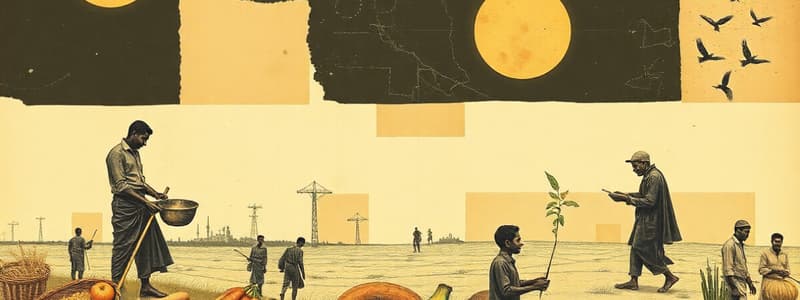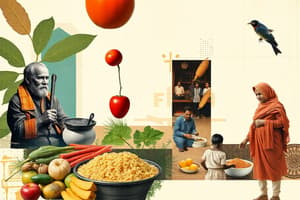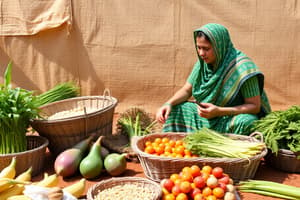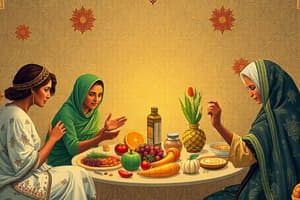Podcast
Questions and Answers
What was the total foodgrain production in 2015-16?
What was the total foodgrain production in 2015-16?
252.22 million tonnes
Which states recorded significant production of wheat in 2015-16?
Which states recorded significant production of wheat in 2015-16?
Uttar Pradesh and Madhya Pradesh
What was the foodgrain production in 2016-17?
What was the foodgrain production in 2016-17?
275.68 million tonnes
How has the percentage of seasonal and chronic hunger changed in India?
How has the percentage of seasonal and chronic hunger changed in India?
What major agricultural strategy was adopted in India in the early 1970s?
What major agricultural strategy was adopted in India in the early 1970s?
What was the purpose of the special stamp released by Indira Gandhi in July 1968?
What was the purpose of the special stamp released by Indira Gandhi in July 1968?
What were the significant rice production figures for West Bengal and Uttar Pradesh in 2015-16?
What were the significant rice production figures for West Bengal and Uttar Pradesh in 2015-16?
In which year did India cross the 200 million tonne mark in foodgrain production?
In which year did India cross the 200 million tonne mark in foodgrain production?
What is the Minimum Support Price (MSP) and why is it announced?
What is the Minimum Support Price (MSP) and why is it announced?
In which decade did India experience significant growth in foodgrain production?
In which decade did India experience significant growth in foodgrain production?
What is the purpose of the MSP in relation to crop production?
What is the purpose of the MSP in relation to crop production?
How does the government provide support to farmers before the sowing season?
How does the government provide support to farmers before the sowing season?
What trend can be seen from 2000 to 2020 in the given graph?
What trend can be seen from 2000 to 2020 in the given graph?
Which governmental department is responsible for declaring the Minimum Support Price?
Which governmental department is responsible for declaring the Minimum Support Price?
What happens to the foodgrains purchased by the government?
What happens to the foodgrains purchased by the government?
What is the significance of storing foodgrains in granaries?
What is the significance of storing foodgrains in granaries?
What items are typically stocked at ration shops?
What items are typically stocked at ration shops?
Why was rationing introduced in India in the 1940s?
Why was rationing introduced in India in the 1940s?
What are the three types of ration cards mentioned?
What are the three types of ration cards mentioned?
During which decade was the rationing system revived due to food shortages?
During which decade was the rationing system revived due to food shortages?
What is the stipulated monthly grain amount a family can buy with a ration card?
What is the stipulated monthly grain amount a family can buy with a ration card?
What is the purpose of the Public Distribution System (PDS)?
What is the purpose of the Public Distribution System (PDS)?
What initiative was introduced in 1975 as part of child development services?
What initiative was introduced in 1975 as part of child development services?
What is the significance of the Food-for-Work (FFW) program introduced in 1977-78?
What is the significance of the Food-for-Work (FFW) program introduced in 1977-78?
How do the prices of rice and sugar at a ration shop compare to other grocery shops?
How do the prices of rice and sugar at a ration shop compare to other grocery shops?
Do families eligible for ration cards face additional poverty alleviation programs?
Do families eligible for ration cards face additional poverty alleviation programs?
What has contributed to the increased maintenance costs of procuring foodgrains in India?
What has contributed to the increased maintenance costs of procuring foodgrains in India?
How has the per capita consumption of rice changed in rural India from 2004-05 to 2011-12?
How has the per capita consumption of rice changed in rural India from 2004-05 to 2011-12?
What role do cooperatives play in food security in India?
What role do cooperatives play in food security in India?
What malpractices have been reported among PDS dealers in India?
What malpractices have been reported among PDS dealers in India?
What percentage increase has been seen in per capita consumption of PDS wheat since 2004-05?
What percentage increase has been seen in per capita consumption of PDS wheat since 2004-05?
What principle was adopted by the Targeted Public Distribution System (TPDS)?
What principle was adopted by the Targeted Public Distribution System (TPDS)?
What were the two special schemes launched in 2000 under the Public Distribution System?
What were the two special schemes launched in 2000 under the Public Distribution System?
What does the acronym BPL stand for in the context of the Public Distribution System?
What does the acronym BPL stand for in the context of the Public Distribution System?
What is the maximum amount of foodgrains allocated to BPL households per month under the TPDS?
What is the maximum amount of foodgrains allocated to BPL households per month under the TPDS?
What is the issue price for wheat (W) under the AAY scheme?
What is the issue price for wheat (W) under the AAY scheme?
When was the National Food Security Act (NFSA) introduced, and what is its primary target?
When was the National Food Security Act (NFSA) introduced, and what is its primary target?
What differentiates the issue price for APL and BPL under the TPDS?
What differentiates the issue price for APL and BPL under the TPDS?
What is the coverage target group for the Annapurna Scheme (APS)?
What is the coverage target group for the Annapurna Scheme (APS)?
What is the monthly allocation of food grains to priority households under the NFSA?
What is the monthly allocation of food grains to priority households under the NFSA?
What was the main objective of the Public Distribution System when it was first introduced?
What was the main objective of the Public Distribution System when it was first introduced?
Flashcards
What is the Green Revolution?
What is the Green Revolution?
The Green Revolution was a period of significant agricultural advancements, particularly in wheat and rice production, that began in the early 1970s in India and other developing countries. It aimed to increase food production and improve food security.
What does it mean to be self-sufficient in food grains?
What does it mean to be self-sufficient in food grains?
Self-sufficiency in food grains means a country can produce enough food to meet the needs of its population without relying on imports. India achieved this goal due to the Green Revolution.
What is food security?
What is food security?
Food security refers to the ability of a country to consistently provide its population with enough safe, nutritious food to maintain a healthy and active life. India has achieved significant food security since the Green Revolution.
What is the significance of the "Wheat Revolution" stamp?
What is the significance of the "Wheat Revolution" stamp?
Signup and view all the flashcards
Which states excel in wheat and rice production in India?
Which states excel in wheat and rice production in India?
Signup and view all the flashcards
What effect has the Green Revolution had on hunger in India?
What effect has the Green Revolution had on hunger in India?
Signup and view all the flashcards
Why has India avoided famines despite adverse weather conditions?
Why has India avoided famines despite adverse weather conditions?
Signup and view all the flashcards
What is Minimum Support Price (MSP)?
What is Minimum Support Price (MSP)?
Signup and view all the flashcards
When did India cross the 200 million tonne food grain production mark?
When did India cross the 200 million tonne food grain production mark?
Signup and view all the flashcards
What is a granary?
What is a granary?
Signup and view all the flashcards
What is the sowing season?
What is the sowing season?
Signup and view all the flashcards
What is the sowing season?
What is the sowing season?
Signup and view all the flashcards
What is food grain production?
What is food grain production?
Signup and view all the flashcards
What is the 1990s decade?
What is the 1990s decade?
Signup and view all the flashcards
What is rationalization?
What is rationalization?
Signup and view all the flashcards
What is a graph?
What is a graph?
Signup and view all the flashcards
What is a Ration Shop?
What is a Ration Shop?
Signup and view all the flashcards
What is Rationing?
What is Rationing?
Signup and view all the flashcards
What is a Ration Card?
What is a Ration Card?
Signup and view all the flashcards
What is an Antyodaya Card?
What is an Antyodaya Card?
Signup and view all the flashcards
What is a BPL Card?
What is a BPL Card?
Signup and view all the flashcards
What is an APL Card?
What is an APL Card?
Signup and view all the flashcards
What is the Public Distribution System (PDS)?
What is the Public Distribution System (PDS)?
Signup and view all the flashcards
What is the Integrated Child Development Services (ICDS)?
What is the Integrated Child Development Services (ICDS)?
Signup and view all the flashcards
What is the Food-for-Work Programme (FFW)?
What is the Food-for-Work Programme (FFW)?
Signup and view all the flashcards
What are Poverty Alleviation Programmes (PAPs)?
What are Poverty Alleviation Programmes (PAPs)?
Signup and view all the flashcards
What are the costs associated with increased MSP procurement?
What are the costs associated with increased MSP procurement?
Signup and view all the flashcards
How do cooperatives contribute to food security?
How do cooperatives contribute to food security?
Signup and view all the flashcards
How has consumption of rice changed in India since 2004-05?
How has consumption of rice changed in India since 2004-05?
Signup and view all the flashcards
What are some challenges with the Public Distribution System (PDS)?
What are some challenges with the Public Distribution System (PDS)?
Signup and view all the flashcards
Public Distribution System (PDS)
Public Distribution System (PDS)
Signup and view all the flashcards
Targeted Public Distribution System (TPDS)
Targeted Public Distribution System (TPDS)
Signup and view all the flashcards
Antyodaya Anna Yojana (AAY)
Antyodaya Anna Yojana (AAY)
Signup and view all the flashcards
Annapurna Scheme (APS)
Annapurna Scheme (APS)
Signup and view all the flashcards
National Food Security Act (NFSA)
National Food Security Act (NFSA)
Signup and view all the flashcards
Differential Pricing Policy
Differential Pricing Policy
Signup and view all the flashcards
Foodgrain Distribution
Foodgrain Distribution
Signup and view all the flashcards
Beneficiary Categories (BPL, APL)
Beneficiary Categories (BPL, APL)
Signup and view all the flashcards
Foodgrain Allocation
Foodgrain Allocation
Signup and view all the flashcards
Foodgrain Volume
Foodgrain Volume
Signup and view all the flashcards
Study Notes
Food Security in India
- Food security encompasses availability, accessibility, and affordability of food for all people at all times.
- Vulnerable households are particularly susceptible to food insecurity during periods of crop production or distribution issues.
- Public distribution systems (PDS) and government intervention are crucial for food security.
- Food security is critical for human well-being and survival, not merely adequate caloric intake.
- Food security includes physical and economic access to nutritious food, respecting dietary preferences.
- Availability involves domestic production, imports, and government grain reserves.
- Accessibility means food is readily available within reach of all individuals.
- Affordability implies individuals can purchase sufficient, safe, and nutritious food.
- Food security is essential to ensure food is available at all times, regardless of crises like drought or calamity.
- Natural disasters, like droughts, earthquakes, can significantly disrupt the availability of food, leading to escalating prices and potential starvation.
- Total crop failure during natural disasters can create food shortages and increase prices.
- Inadequate access to food during times of calamity can result from extremely high prices.
- Prolonged natural crises can lead to famine, with widespread death.
- The Bengal famine of 1943 tragically illustrates the devastating impact of food shortages.
- Agricultural laborers, fishermen, and casual laborers were disproportionately affected by the Bengal famine of 1943.
- The famine of 1943 resulted in the death of 3 million people in Bengal.
- Food insecurity is disproportionately prevalent in certain regions of the country, particularly those with high poverty levels, frequent natural disasters, and economic vulnerabilities.
- The National Food Security Act (NFSA) introduced in 2013 to ensure food security aims to address food scarcity.
- NFSA ensured food security for 75% of the rural and 50% of the urban poor.
- The NFSA aims to alleviate hunger and provide access to food at reasonable prices.
- Buffer stock reserves are held to maintain supplies and affordability during periods of shortage.
- The government releases food from the reserves to control prices and ensure affordability among vulnerable populations.
- Cooperatives play a vital role in enhancing rural food security by ensuring affordable access to essential food items.
Hunger in India
- Types of hunger : Seasonal and chronic and their prevalence in India..
- Data on prevalence of hunger in India.
- Declining trends in hunger, both chronic and seasonal.
Green Revolution
- The Green Revolution’s positive impact on self-sufficiency in food production.
- India’s progress in wheat and rice production since Independence and the role of the Green Revolution.
- Increase in food production, especially wheat and rice, following the Green Revolution and government interventions.
- Contributing factors to the green revolution.
Food Production in India
- Changes in food grain production in India across several years in the later 20th century and 21st century.
- Data illustrating the growth in food grain production in India over recent years and decades.
Food Procurement and Distribution System
- Minimum Support Price (MSP) as an incentive to farmers.
- Buffer stocks, procured by the Food Corporation of India (FCI)
- The Public Distribution System (PDS) to distribute food at affordable prices.
- Role of cooperatives in providing food access.
- Price fluctuations in food grains.
Relation Between Food and Poverty
- The relationship between hunger, food security and poverty in rural India and its causes.
- Impact of poverty on food availability and affordability.
Studying That Suits You
Use AI to generate personalized quizzes and flashcards to suit your learning preferences.




